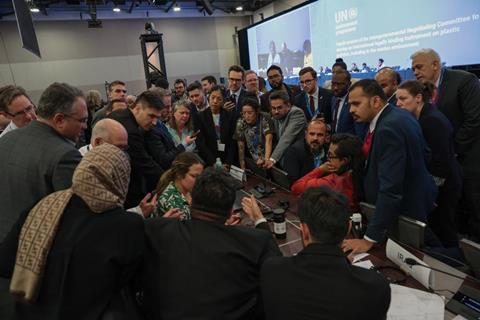
Photo by IISD/ENB | Kiara Worth
The latest round of negotiations on the creation of the United Nations’ legally-binding treaty on plastic pollution has ended. And, while important progress has certainly been made, there were still a number of setbacks and shortfalls. To learn more about all of this, we spoke with Erin Simon, Vice President and Head of Plastic Waste and Business at WWF, who was present at INC-4.
When we spoke last week before the start of INC-4, we asked you to give your predictions on the likely outcomes of this latest step of the process. Now that INC-4 has ended, how have your predictions matched up with what actually happened?
My predictions were not that far off, but I was a bit overly optimistic when we last spoke.
The good news: At the end of INC-4, we made some progress on the text for key measures that are essential to the success of the treaty, including lists for products, polymers and chemicals of concern, requirements for design standards, and financing.
The majority of countries see the need to be globally aligned on these measures, but some countries want to manage the aspects of the treaty on a national level. We also got the mandate we so desperately needed (after not having one after INC-3) for the intersessional work that I was hoping for.
The not-so-good news: The intersessional work unfortunately does not include a mandate for further discussing the reduction of production of primary plastic polymers.
We also left Ottawa without a new draft of the treaty – and the current draft text is locked between INC-4 and INC-5 which means no additional streamlining or narrowing of the text can happen – leaving a lot of work to do when we arrive in Busan.
I wonder if you’d be able to give us a broad outline of the key positive developments from INC-4 – what aspects or takeaways really stood out for you?
At the end of the week, luckily, most member states agreed on the inclusion of many of the essential ingredients needed for a successful treaty, including addressing problematic and avoidable plastic, considering the criteria for listing chemicals of concern, and establishing design standards for products so they can be easily reused or recycled.
I was also happy to see countries make progress on discussing the importance of Extended Producer Responsibility (EPR) as a key obligation within the treaty, and movement on the financial mechanisms so all countries will be set up to successfully implement the treaty.
And of course, as I already mentioned, we did get a mandate for intersessional work
What are some of the outstanding disagreements between parties that are yet to be resolved?
The biggest miss from my perspective is not including the reduction of primary plastic polymers. This is the quickest path to reduction and without it being mandated to be discussed between now and INC-5, negotiators are not making their job easy to deliver the effective treaty we need.
An honorable mention miss from my perspective would be the locking of the text between sessions. This will make it harder for the negotiations to finish on time and could lead to a slow-moving INC-5.
I gather that there was a fair amount of upset and incredulity at the closing stages of INC-3 due to a reported “deadlock” in proceedings. How are attendees feeling after the end of INC-4?
Attendees are tired – I’m tired. But on the positive side, there was a stronger sense of urgency and even though we didn’t land exactly where we hoped, it was a more productive meeting than INC-3.
Progress, even slow-moving progress is important to acknowledge, while still pushing for more.
I’d like to finish by asking you the same closing question from our previous interview, but this time with the events of INC-4 in the rear-view mirror. If you could send a message to the key stakeholders/decisionmakers – what would it be?
To the negotiators – you put differences aside and got to work, there’s still a long way to go and this process will only get harder because of some of the key measures that were excluded.
It’s important to remember what you agreed to back in March of 2022 – to negotiate an effective and legally binding treaty by the end of 2024. Remember this promise. Making history in Busan later this year will fully depend on your ability to move forward and not let the voices of a few dim the mission of the majority.














No comments yet